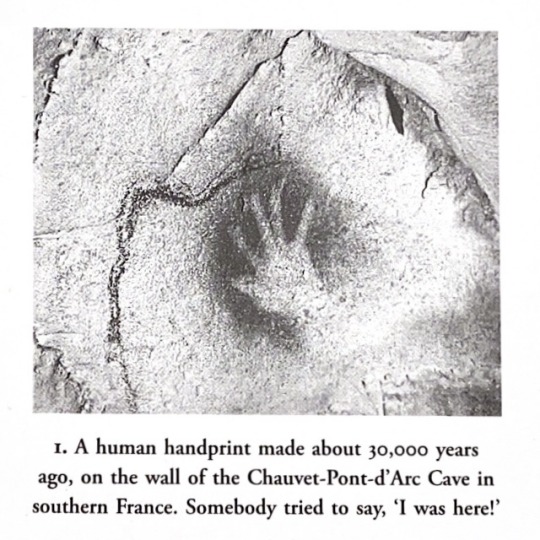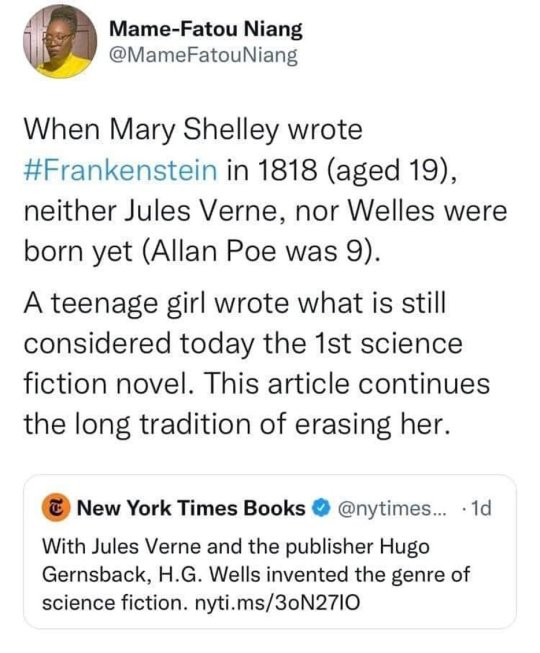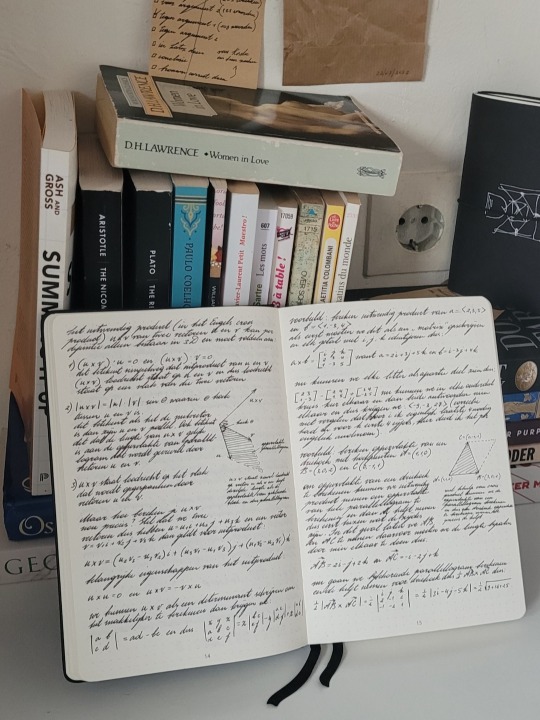#science and literature
Note
frank what is the coolest dinosaur go
I'm actually going to say Tyrannosaurus rex, pictured below the fold:
That's from a book called The Dinosauria by Gregory Paul (my copy is the one pictured here, but a second edition came out in 2010). It's an unusually handsome dinosaur book (because, like, dinosaur books are always going to look good to some extent, y'know?) and is a pretty easy to read popular-format introduction to the topic. I've mentioned Paul before in other contexts (he's a paleontologist but he's also a biblical literalist who wrote a whole book against evolution called The Revolutionary Nature of Karl Marx, so he's not a guy you're gonna see mentioned very often), but he has some good reasons for believing certain dinosaurs (especially tyrannosaurs) are unusually cool.
I actually kind of disagree with him about this, on some level. See, he believes that small theropods (e.g. Velociraptor, Deinonychus, "Jaime" in Jurassic Park) really weren't capable of hunting large prey, because you'd need to be about 10 feet tall to knock down a big horned stegosaur (hence why large predators like T. rex and Giganotosaurus hunted that prey). I'm not too sure about this, because birds evolved from small theropods, and though I don't know for sure they all loved knocking down stegosaurs, they are certainly capable of doing it and there are obvious evolutionary reasons to evolve for it.
Actually, I guess this means that if Deinonychus et al. hunted big prey, maybe modern wildlife biologists would argue that the big prey was adapted to standing upright, because that would be the obvious expectation. But either way, I don't think he's proven his case, and it would be easy enough for a smaller predator to just swarm its prey if it got stuck and start gobbling its way to safety.
I think my bottom line is "small theropods were generally small and I'm not sure we really have a very good idea of what sort of creatures they were, so we can't rule out the possibility that they were scampering buggers who knew how to knock down big prey."
I say this because the reason I think tyrannosaurs, specifically, are cool is mostly because of the various skeletal adaptations that seem to have made them fast-running sprinters with good turning ability, rather than capable of long-distance pursuits (even if they could do that sometimes). And at least one tyrannosaur has been discovered with "bites" all over its body -- these were soft tissues that would stick out from the animal's body and would have been super-sensitive to touch and could have served as heat sensors. Imagine a T. rex that lives under a rock, and whenever another T. rex comes near it loses its shit and writhes around in terror, before backing off and running away.
When I picture that, I feel a little lump in my throat, like I've just seen someone do something deeply pathetic, and as much as I enjoy dinosaurs, I'd rather not have that feeling toward them. (A non-specific "feeling of awesomeness" is great, I will say, but my aesthetic sensibilities would prefer there be a distance between myself and the animals, and as much as I enjoy thinking of myself as part of the dinosaur tree, this is a sentiment that I do not want to propagate.)
The other cool dinosaur, I think, is Ankylosaurus, because they just look cool, like a walking mechanical nightmare, with all those spikes and armour plates:
The other cool dinosaur I know about is Pleurodiris, which you can see in The Dinosauria, but it's been a while and I don't remember its ins and outs (though I kind of want to come back to it in a minute). You see, in the 1980s, a bunch of students from "a local college" (I can't find an obvious indication of where, and Google doesn't seem to have anything on this event, so I don't know how to double-check this info) were excavating dinosaur bones in North Dakota or something, and they discovered a new type of dinosaur.
At the time, it was assumed that dinosaurs had evolved on the mainland of Pangea, not on islands, but a mammalian bone was found in the dinosaur bones, which seemed to indicate the presence of mammals on the island where the dinosaur bones were found. Given this, and the fact that the dinosaurs themselves seemed to be unlike any dinosaur that had ever been found before, Paul concludes that at least some of the dinosaurs in the mainland of Pangea must have evolved into, like, goats or something and then migrated to North America in a colonization wave.
He's not entirely right, because we do now know that dinosaurs lived on islands in the shallow seas near the mainland of Pangea, but at the time, this was a genuinely cool new hypothesis, and it seems at least plausible that "the American continent was colonized by some random dinosaur that evolved into sheep, before sheep-domesticating humans were around to help them out" (or something like that).
3 notes
·
View notes
Text
#science vs literature#Science and literature#Which one is better-science or literature#Literature is more important than science#Science and literature equally greater
1 note
·
View note
Text
look, I know I've talked about this essay (?) before but like,
If you ever needed a good demonstration of the quote "Any sufficiently advanced technology is indistinguishable from magic", have I got an exercise for you.
Somebody made a small article explaining the basics of atomic theory but it's written in Anglish. Anglish is basically a made-up version of English where they remove any elements (words, prefixes, etc) that were originally borrowed from romance languages like french and latin, as well as greek and other foreign loanwords, keeping only those of germanic origin.
What happens is an english which is for the most part intelligible, but since a lot everyday english, and especially the scientific vocabulary, has has heavy latin and greek influence, they have to make up new words from the existing germanic-english vocabulary. For me it kind of reads super viking-ey.
Anyway when you read this article on atomic theory, in Anglish called Uncleftish Beholding, you get this text which kind of reads like a fantasy novel. Like in my mind it feels like it recontextualizes advanced scientific concepts to explain it to a viking audience from ancient times.
Even though you're familiar with the scientific ideas, because it bypasses the normal language we use for these concepts, you get a chance to examine these ideas as if you were a visitor from another civilization - and guess what, it does feel like it's about magic. It has a mythical quality to it, like it feels like a book about magic written during viking times. For me this has the same vibe as reading deep magic lore from a Robert Jordan book.
#off topic#literature#language#linguistics#science#science history#science fiction#fantasy#physics#atomic theory#anglish#chemistry#robert jordan#the wheel of time#uncleftish beholding
43K notes
·
View notes
Text



Vajra Chandrasekera is a Locus and Nebula award-winner and has been short-listed for a Hugo Award this year. You can find his Tumblr here: @adamantine and his twitter here: @_vajra
#capitalism#ableism#sexism#anti blackness#colonialism#racism#colonial capitalism#colonial violence#imperialism#poverty#global south#elitism#classism#western imperialism#colonization#gaza writes back#vajra chandrasekera#saint of bright doors#rakesfall#science fiction#genius#art#writing#literature#social justice#individualism#twitter thread#knee of huss#inequality#misogyny
5K notes
·
View notes
Text

sapiens: a brief history of humankind
#currently reading#booklr#sapiens#sapiens: a brief history of» humankind#yuval noah harari#history#science#nature#literature#humankind#my scan
6K notes
·
View notes
Text
Scientific Literature – Genre of Science Fiction
Modern science fiction is the only form of literature that consistently considers the nature of the changes that face us. – Isaac Asimov
What role knowledge of scientific thoughts can play in understanding and appreciating literature? At the outset answer is nothing as science is fact and literature is fiction. A predominate view that is prevalent and we are largely preview to that form of…

View On WordPress
0 notes
Text

#Books#horror#frankenstein#science fiction#literature#feminism#poe#lit#gothic literature#gothic aesthetic
675 notes
·
View notes
Quote
I don't miss him anymore. Most of the time, anyway. I want to. I wish I could but unfortunately, it's true: time does heal. It will do so whether you like it or not, and there's nothing anyone can do about it. If you're not careful, time will take away everything that ever hurt you, everything you have ever lost, and replace it with knowledge. Time is a machine: it will convert your pain into experience. Raw data will be compiled, will be translated into a more comprehensible language. The individual events of your life will be transmuted into another substance called memory and in the mechanism something will be lost and you will never be able to reverse it, you will never again have the original moment back in its uncategorized, preprocessed state. It will force you to move on and you will not have a choice in the matter.
Charles Yu, How to Live Safely in a Science Fictional Universe
1K notes
·
View notes
Text
Here's how to spot a Mad Scientist:
Is very smart in a specific field
Probably hasn't slept in the past 4 days
Depressed
Slowly decends into madness/gets obsessed over something to the point where they destroy their lives over it/makes causing general chaos and destruction into their life goal
Here are other minor signs you might want to look out for (doesn't apply to all Mad Scientist):
Very pathetic. A loser, if you will
Is gay
Wears glasses
Has a best friend who is extremely friendly and also a poet
Graying hair despite their relatively youthful appearance
Can be a little bit silly (as a treat)
Note that not all Mad Scientists are actual scientists. The Mad Scientist can be disguised as something else and may try to trick you; do not be fooled. Look for these traits to identify a real wild Mad Scientist.
Now you are ready to go out into the wild and find your very own Mad Scientists to hyperfixate on for the next month! Hope this helped❤️
#jekyll and hyde#frankenstein#viktor arcane#jonathan sims#the strange case of dr jekyll and mr hyde#victor frankenstein#the magnus archives#arcane#dr jekyll and mr hyde#henry jekyll#edward hyde#yes i am hyperfixating on them#yes i simp for them all#yes I am also including c!Wilbur in this category#what are you gonna do about it??#TECHNICALLY ROBOTNIK FROM THE SONIC MOVIE TOO#I WILL HYPERFOXATE ON ALL THE MAD SCIENTISTS AND NO ONE WILL STOP ME#mad scientist#mad science#character trope#character tropes#maybe the real hyperfixation was the simp i became along the way#gothic literature#classic literature memes#classic literature#frankenstein or the modern prometheus#autism#adhd#ALSO STANFORD PINES!!!
677 notes
·
View notes
Text









Joshua Moritz, 'Is There a God-Shaped Hole at the Heart of Mathematics?' // Bluepoch Games, Reverse 1999 // Li C. Tien, "Right Triangle" // Proclus Diadochus // @lothmoth // Lisa Rosenberg, "Introduction to Methods of Mathematical Physics" // Wassily Kadinsky, watercolour abstract // Albert Einstein // see 4
#theme: the beauty of mathematics#web weaving#webs#web weave#is this too niche#sorry people who hate maths#poetry#prose#aesthetic#prose poetry#literature#art#quotes#philosophy#mathematics#science#writing#poems#poems and poetry#parallels#compilation#reverse 1999#inspo#painting#book quotes#novels#maths
959 notes
·
View notes
Text
Science is More Important Than Literature
The majority believes that science is more important than literature, but if you delve deeper, your answer will be quite opposite, and vice versa. Einstein also says that imagination is more important than science. Literature deals with imagination, and science converts that imagination into reality. You retain concepts in terms of language. And, science is a fixed concept that is understood via language. Language cannot be retained in numbers....Expand
#science#literature#Which is better science or literature#Literature debate#Education#Science and literature
0 notes
Text
Dune lore is fucking insane. I just finished the first book, and have concluded that Frank Herbert is a goddamn genius.
20,000 years in the future.
Matriarchal cult of eugenisist space-nuns with weird psychic powers
Houses that resemble the royalty of medieval earth, all still obsessed with power and profit over everything else
complex religions with clear inspirations of real-world present religions (specifically catholicism and islam)
Human supercomputers?? that are also assassins??
A prison planet that creates supersoldiers by killing the weak to filter out the strongest
the main villain being the physical embodiment of sin (gluttony, lust, greed)
politics. holy war. oppression of native peoples. false prophets. cults. drugs. worms.
and that just scratches the surface. theres five more books…
#dune#dune book#dune series#paul atreides#lady jessica#bene gesserit#arrakis#baron harkonnen#fremen#sandworm#shai hulud#muad’dib#lisan al gaib#mentat#thufir hawat#gurney halleck#chani kynes#duncan idaho#frank herbert#science fiction#classic literature#geidi primes#salusa secundus#sardaukar#padishah emperor#princess irulan
817 notes
·
View notes
Text


january this january that
#studyblr#dark academia#math#mathblr#physics#study aesthetic#space#science#astronomy#astrophysics#student#telescope#light academia#physicsblr#chaotic academia#dark acadamia aesthetic#historyblr#literature#chemblr#chemistry#intp#intj#student life#winter#langblr#bookblr#study inspo#study inspiration
1K notes
·
View notes
Text

In a post-truth world, where emotional appeal sometimes drowns out factual accuracy, the humanities are our compass. They help us question the narratives we’re presented with, cultivate empathy, and dig deeper into the layers of truth behind media, politics, and culture.
By embracing literature, history, and the arts, we enhance our critical thinking and foster a connection to the human stories that shape our collective experience. 💭
Check out our latest blog post on how the humanities equip us to navigate the complexities of a world filled with conflicting truths.
#jstor#jstor blog#humanities#literature#history#the arts#social sciences#culture#politics#media#post-truth
250 notes
·
View notes
Text
Contemporary Japanese light novels and classic American sci-fi are basically evil opposites when it comes to their titling conventions: both titles will be long and rambling, but the former will be a prosaically descriptive phrase that lays out the story's entire premise, while the latter will be a line from a poem the author liked that tells you absolutely fucking nothing.
10K notes
·
View notes